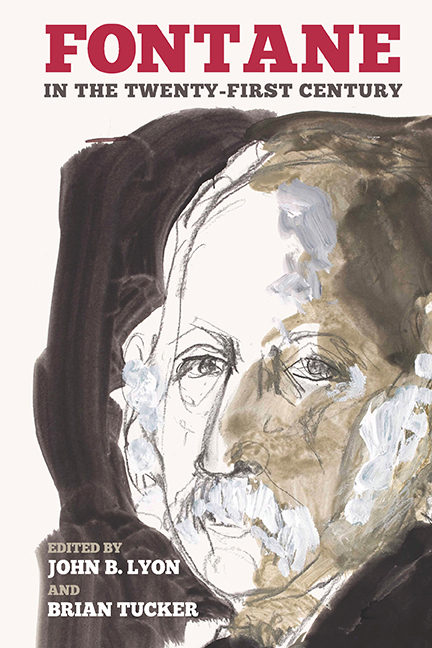Book contents
- Frontmatter
- Contents
- Acknowledgments
- Note on Editions
- Introduction: Fontane in the Twenty–First Century
- 1 Narrative Digression and the Transformation of Nationhood in Vor dem Sturm
- 2 Nasty Women: Female Anger as Moral Judgment in Grete Minde and Effi Briest
- 3 Performing the Philistine: Gossip as a Narrative Device and a Strategy for Reflection on Anti-Semitism in Theodor Fontane's L'Adultera
- 4 To Have an Eye: Visual Culture and the Misapprehension of Class in Irrungen, Wirrungen
- 5 Fontane as a Pacifist? The Antiwar Message in Quitt (1890) and Fontane's Changing Attitude to Militarism
- 6 Disjunctive Transnationalisms in Fontane's Frau Jenny Treibel
- 7 On the “Right Measure” in Effi Briest: Ethics and Aesthetics of the Prosaic
- 8 Transfiguration, Effect, and Engagement: Theodor Fontane's Aesthetic Thought
- 9 Fontane and World Literature: Prussians, Jews, and the Specter of Africa in Die Poggenpuhls
- 10 Von Zwanzig bis Dreißig: The Male Author in Parts
- 11 Melusine von Barby's Barriers and Connections in Fontane's Der Stechlin
- 12 Senescence and Fontane's Der Stechlin
- Notes on the Contributors
- Index
5 - Fontane as a Pacifist? The Antiwar Message in Quitt (1890) and Fontane's Changing Attitude to Militarism
Published online by Cambridge University Press: 31 August 2019
- Frontmatter
- Contents
- Acknowledgments
- Note on Editions
- Introduction: Fontane in the Twenty–First Century
- 1 Narrative Digression and the Transformation of Nationhood in Vor dem Sturm
- 2 Nasty Women: Female Anger as Moral Judgment in Grete Minde and Effi Briest
- 3 Performing the Philistine: Gossip as a Narrative Device and a Strategy for Reflection on Anti-Semitism in Theodor Fontane's L'Adultera
- 4 To Have an Eye: Visual Culture and the Misapprehension of Class in Irrungen, Wirrungen
- 5 Fontane as a Pacifist? The Antiwar Message in Quitt (1890) and Fontane's Changing Attitude to Militarism
- 6 Disjunctive Transnationalisms in Fontane's Frau Jenny Treibel
- 7 On the “Right Measure” in Effi Briest: Ethics and Aesthetics of the Prosaic
- 8 Transfiguration, Effect, and Engagement: Theodor Fontane's Aesthetic Thought
- 9 Fontane and World Literature: Prussians, Jews, and the Specter of Africa in Die Poggenpuhls
- 10 Von Zwanzig bis Dreißig: The Male Author in Parts
- 11 Melusine von Barby's Barriers and Connections in Fontane's Der Stechlin
- 12 Senescence and Fontane's Der Stechlin
- Notes on the Contributors
- Index
Summary
QUITT IS FONTANE's most political novel, but Fontane's bold indictment of German militarism has been all but lost in a critical debate over authenticity issues in the second half of the novel, set in the Indian Territory of the United States. Recent research, however, showing that Fontane's portrayal of the Mennonite missions in the Indian Territory is an accurate one based on a considerable amount of research on his part, allows the reader to concentrate more on the novel's message of pacifism. How was it possible that Fontane, so well-known for his voluminous reports on Prussian-led wars against Denmark, Austria, and France (1864–71) that he was once described by Prussian military historian Lieutenant Colonel Max Jähns as “a soldier at heart” who had always “loved” Prussian military tradition, could by the 1890s have changed his mind to such an extent that he writes that militarism must go because it has become intolerable? And how does Quitt fit in with this process? In this chapter I will examine the reasons why Fontane felt it was a thematic necessity to set the second half of the novel in the Indian Territory, and, with some reference to Fontane's biblical allusions, investigate the pacifist elements in the novel, drawing parallels with Fontane's own experience of the military and his changing attitude to war from 1866 onward.
The novel opens in Krummhübel, a forest village on the Silesian slopes of the Riesengebirge. Lehnert Menz is involved in a dispute with the local ranger, Opitz, who, as Lehnert's commanding officer during the Franco-Prussian War, had prevented him from being considered for an Iron Cross. The dispute escalates until Lehnert provokes Opitz into shooting him. Lehnert shoots him in retaliation, invoking the argument of self-defense, but when he realizes the town authorities are after him, he mysteriously disappears and escapes to the United States. In the second half of the novel, Lehnert has set out from Fort McCulloch to Fort Holmes, in the Indian Territory of the United States, where he hears about a German Mennonite community in Darlington. The peaceful and tolerant community that Obadja Hornbostel has built up around him in Darlington stands in stark contrast to the militaristic and hierarchical Prussian society that Lehnert left behind.
- Type
- Chapter
- Information
- Fontane in the Twenty-First Century , pp. 84 - 102Publisher: Boydell & BrewerPrint publication year: 2019

